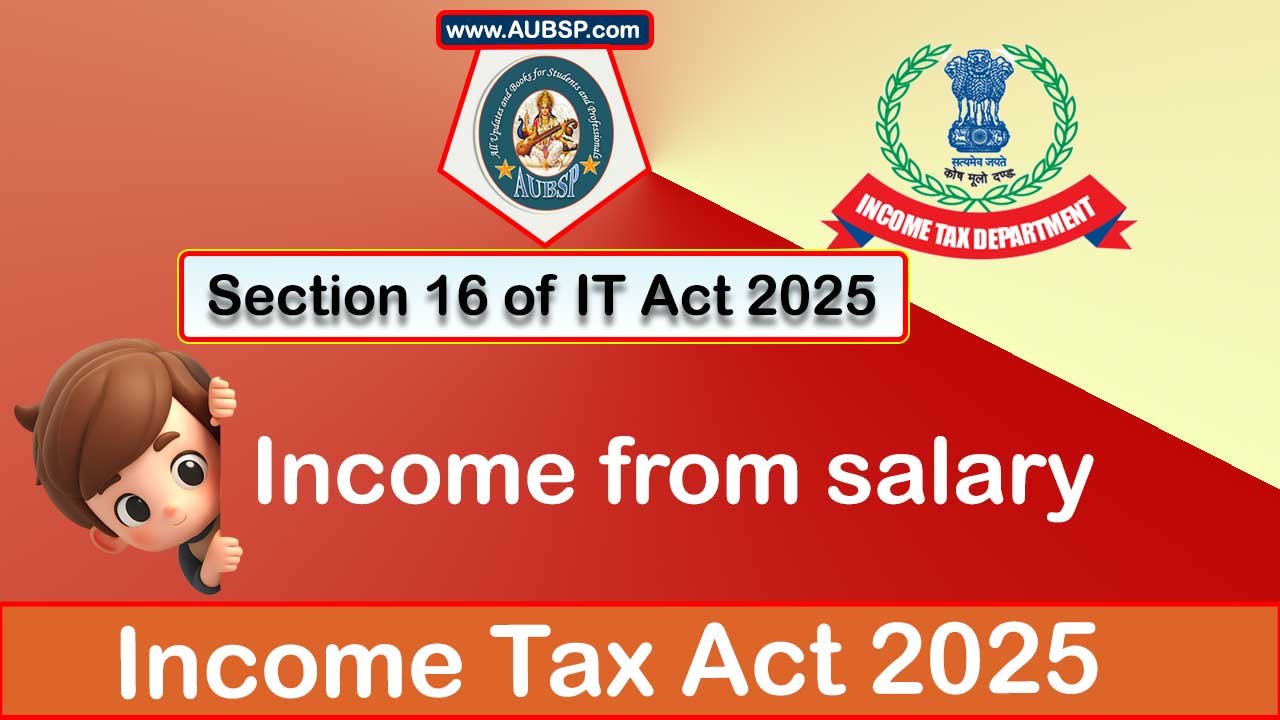Income from salary
[Section 16 as per the Income Tax Act, 2025 (this Act) w.e.f. 1st April, 2026.]
For the purposes of this Part, “salary” includes—
- (a) wages;
- (b) any annuity or pension;
- (c) any gratuity;
- (d) any fees or commission;
- (e) perquisites;
- (f) profits in lieu of, or in addition to, any salary or wages;
- (g) any advance of salary;
- (h) any payment received by an employee in respect of any period of leave not availed of by him;
- (i) the annual accretion to the balance at the credit of an employee participating in a recognised provident fund, to the extent to which it is chargeable to tax as per paragraph 6 of Part A of Schedule XI;
- (j) the aggregate of all sums that are comprised in the transferred balance as referred to in paragraph 11(2) of Part A of Schedule XI of an employee participating in a recognised provident fund, to the extent to which it is chargeable to tax under sub-paragraphs (4) and (5) thereof;
- (k) the contribution made by the Central Government or any other employer in any tax year, to the account of an employee under a pension scheme referred to in section 124; and
- (l) the contribution made by the Central Government in any tax year, to the Agniveer Corpus Fund account of an individual enrolled in the Agnipath Scheme referred to in section 125.
FAQs on Section 16 of the Income Tax Act 2025
Frequently asked questions (FAQs) on Income Tax Act 2025 – Section 16 relates to the Income from Salary for the tax year 2025-26:
1. What is considered “salary” under Section 16 of the Income Tax Act, 2025?
Salary includes wages, annuities, pensions, gratuities, fees, commissions, perquisites, and various other payments related to employment.
2. Are perquisites taxable as part of salary?
Yes, perquisites (such as rent-free accommodation, company car, etc.) are included in salary and are taxable based on prescribed valuation rules.
3. Is leave encashment taxable?
Yes, any payment received by an employee for unavailed leave is considered salary and is taxable. However, exemptions may be available in certain cases.
4. Is an advance salary taxable?
Yes, any advance salary received by an employee is taxable in the year of receipt.
5. How is gratuity taxed under salary income?
Gratuity is part of salary income and is taxable, but exemptions are available under specified conditions for government and non-government employees.
6. Is the employer’s contribution to the Provident Fund taxable?
Employer contributions to a Recognised Provident Fund (RPF) are partially taxable as per limits prescribed in Schedule XI, Part A, Paragraph 6 of the Act.
7. How are transferred balances in a recognised provident fund taxed?
Transferred balances as per Schedule XI, Part A, Paragraph 11(2) are taxed based on conditions in sub-paragraphs (4) and (5).
8. Is the employer’s contribution to a pension scheme taxable?
Yes, contributions by employers to pension schemes under Section 124 are taxable as part of salary income.
9. What about the Agniveer Corpus Fund under Section 125?
The Central Government’s contribution to the Agniveer Corpus Fund is considered part of salary and is taxable.
10. Are commissions and bonuses included in salary income?
Yes, any commission, bonus, or incentive received from an employer is considered part of salary and is taxable.
11. Is a pension considered salary income?
Yes, pensions (except commuted pensions in some cases) are included in salary income and are taxable.
12. Are employer-paid insurance premiums taxable?
Employer-paid insurance premiums for employees may be considered a perquisite and could be taxable, depending on the type of insurance and conditions.
13. Are salaries received from foreign employers taxable in India?
Yes, if the individual qualifies as a resident in India for tax purposes, global income, including salary from foreign employers, is taxable in India.
14. Are retrenchment compensation and voluntary retirement scheme (VRS) payments taxable?
Yes, but specific exemptions are available based on limits prescribed under the Income Tax Act.
Section 16 of the Income Tax Act, 2025 comprehensively defines salary income and includes various components such as wages, pensions, gratuities, perquisites, and employer contributions to provident and pension funds. Most salary components are taxable, but certain exemptions and deductions may apply based on specific provisions.
Understanding the taxability of salary income is essential for proper tax planning and compliance. Employees should be aware of the tax treatment of different salary components to optimize their tax liabilities and take advantage of available deductions.
For further clarity on exemptions, deductions, or specific cases, consulting a tax professional or referring to detailed provisions in the Income Tax Act, 2025 is recommended.

